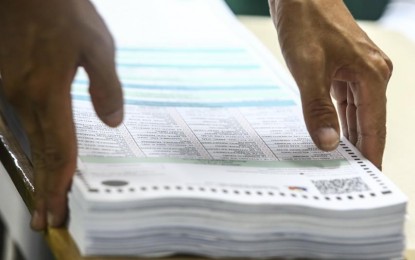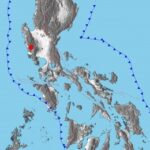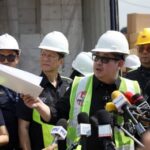MANILA — The Commission on Elections (Comelec) will begin printing over 90 million ballots for the November 2, 2026 Barangay and Sangguniang Kabataan Elections (BSKE) starting Monday.
Printing will start at 1 p.m. at the National Printing Office (NPO) in Quezon City, covering both official ballots and accountable forms for the synchronized village and youth elections.
“This is the first time in the history of Comelec and the National Printing Office that we will print more than 90 million ballots. This is the first time we are printing this many ballots,” the Comelec chair said.
The total includes 69 million ballots for the barangay elections and 23 million for the SK elections.
The Comelec decided to begin printing more than a year before election day to ensure adequate preparation and allow time to address any technical or logistical issues that may arise.
“We want to make sure that if there are any problems, at least our printing, including verification, will be completed as soon as possible,” the official explained.
As voter registration resumes on October 20 and will run until May 18, 2026, the total number of ballots may potentially reach 95 million.
In August, the President signed Republic Act No. 12232, which resets the December 1, 2025 BSKE to the first Monday of November 2026.
The law is intended to allow Comelec to fully focus on the first-ever Bangsamoro Autonomous Region in Muslim Mindanao (BARMM) parliamentary elections.
However, the BARMM polls that were supposed to be held on October 13 were also rescheduled to March 31, 2026 after the Supreme Court declared Bangsamoro Autonomy Act Nos. 58 and 77 unconstitutional, which had created and reconstituted parliamentary districts in the region.
National Printing Office
The National Printing Office is a government agency responsible for producing official documents, currency, and stamps. Historically, many countries established their own national printing offices in the 19th century to centralize and secure the production of vital state materials, ensuring authenticity and preventing forgery. These institutions remain crucial for a nation’s security, financial system, and administrative functions.
Quezon City
Quezon City was founded in 1939 and served as the capital of the Philippines from 1948 to 1976, replacing Manila. It was named after Manuel L. Quezon, the second President of the Philippines, who envisioned a new capital city. Today, it is the most populous city in the country and a major center for government, education, and commerce.
Commission on Elections
The Commission on Elections (COMELEC) is the constitutional commission responsible for enforcing and administering all election laws and regulations in the Philippines. It was established in 1940 to ensure free, orderly, and honest elections, and it oversees the entire electoral process, from voter registration to the proclamation of winners.
Barangay and Sangguniang Kabataan Elections
The Barangay and Sangguniang Kabataan Elections are local polls in the Philippines to choose leaders at the smallest government unit, the barangay, and its youth council. Historically, these elections have often been postponed by national lawmakers, leading to extended terms for incumbents. They are crucial for grassroots democracy and youth participation in community affairs.
Bangsamoro Autonomous Region in Muslim Mindanao
The Bangsamoro Autonomous Region in Muslim Mindanao (BARMM) is a self-governing region in the southern Philippines, established in 2019 to replace the Autonomous Region in Muslim Mindanao (ARMM). Its creation was the result of a decades-long peace process between the Philippine government and Moro Islamic liberation fronts, aiming to end a long-standing conflict and grant meaningful self-governance to the region’s predominantly Muslim population. The region is rich in Islamic culture and history, distinct from the predominantly Christian mainstream of the Philippines.
Supreme Court
The Supreme Court is the highest judicial body in the United States, established in 1789 by Article III of the U.S. Constitution. It serves as the final arbiter of federal law and the Constitution, ensuring uniform interpretation through its power of judicial review, which was established by the landmark 1803 case *Marbury v. Madison*.
Republic Act No. 12232
“Republic Act No. 12232” is not a physical place or cultural site, but a law in the Philippines. It is known as the “Transnational Higher Education Act,” which was signed in 2019. This act allows foreign higher education institutions to establish and operate programs in the Philippines, aiming to enhance the quality and global competitiveness of the country’s education system.
Bangsamoro Autonomy Act Nos. 58 and 77
These are legislative acts passed by the Bangsamoro Parliament in the southern Philippines. Act No. 58 officially adopted “Bangsamoro Hymn” and “Bangsamoro Flag” as regional symbols in 2021, while Act No. 77 established the “Bangsamoro Sports Commission” in 2023 to promote athletic development. These laws are part of the ongoing political transition to establish self-governance for the Bangsamoro region.






